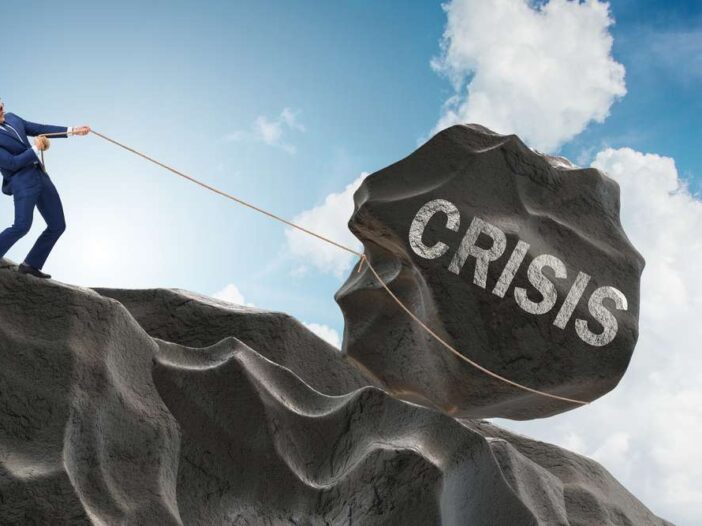Dear Reader,
World history has turning points.
The difference between a true turning point and just another crisis is not the event itself.
It’s what comes after.
The 1962 Cuban Missile Crisis was a turning point. The Cold War was never the same after that crisis, which prompted a multidecade era of arms-control treaties designed to contain the arms race.
The 1987 flash crash was not a turning point.
Not much changed except the introduction of circuit breakers on the New York Stock Exchange.
The 1973 oil embargo was a turning point.
It marked the emergence of oil as a geopolitical weapon and the creation of Henry Kissinger’s petrodollar standard, which has prevailed ever since.
The 2008 financial crisis was not a turning point.
How to Survive Australia’s Biggest Recession in 90 Years. Download your free report and learn more.
It came and went. It was not long before Wall Street and stock markets around the world were back to business as usual, fleecing savers and inflating asset bubbles.
COVID-19 is a turning point
This pandemic — and the economic aftermath that continues in 2021 and beyond — is a true turning point.
It’s perhaps the biggest you will face as an investor in your lifetime.
The decision that you make in relation to it — decisions you really have to make pretty much now — will have ripple effects for the rest of your lifetime.
It may seem like an overstatement.
It’s not.
The paths you decide to take with your wealth in the first quarter of 2021 will have ramifications for how much wealth you may have in the 2030s.
It is for this very reason that I so vehemently urge you to avail yourself of a copy of the new book both Jim Rickards and I have put our hearts and minds into.
It’s called The New Great Depression: Winners and Losers in a Post-Pandemic World.
We have developed a uniquely Australian edition for our readers.
And, very soon, you will be shown how to access an exclusive pre-Australia-publication copy.
I hope you do.
And I encourage you to share the information freely with anyone you hold near and dear.
You may have already noticed The New Great Depression being promoted around the world. It’s already making waves, right up there on the Amazon sellers list.
That’s the international edition.
It doesn’t get its official publication here in Australia until March.
But the decisions you need to make now are of such import they really can’t wait until then.
As such, we’ve managed to pull off something pretty amazing — thanks to the fact that Jim Rickards is already part of our fold.
He’s one of us.
Jim has secured rights for our readers to access an e-book version before the official Australian launch. Not only that, it’s a uniquely Australia edition you won’t find on any bookshop shelf or online store on the planet.
You’ll be shown how to download this early copy within the next few days.
Please do that. And then read it cover to cover as soon as you can.
It will take years for the full implications of this virus to play out.
Yet we will not return to business as usual after this particular turning point.
You’ll see that pretty clearly as you work through the Australian edition of The New Great Depression: Winners and Losers in a Post-Pandemic World.
The hint is in the title.
The mainstream is so distracted with the political implosion in the United States, it has missed a crucial point.
We are entering a ‘New Great Depression’.
And depressions truly are different from anything you’ve experienced since you’ve been alive.
There is both good and bad in this new turning point.
The bad is all around us.
In Australia, our economy has not been mortally wounded by the pandemic.
But it will be handicapped for years to come.
People just don’t realise (yet) how badly.
The forever-changed relationship with China, our biggest trading partner, is a huge part of that.
Growth will likely ‘never return’ to pre-virus levels even when the pandemic is over, according to new research firm Capital Economics.
As you will see clearly in The New Great Depression: Winners and Losers in a Post-Pandemic World, this relationship will never be repaired.
It will continue to fester.
And its detrimental effects on every aspect of our economy will grow.
The US was deeply polarised before the twin crises of pandemic and depression.
It almost goes without saying that, after what’s happened since the start of 2021, it is more so now.
As Jim Rickards points out:
‘Investors may be encouraged by new all-time highs in the stock market. But the stock market indices are cap-weighted or formatted in favor of a small number of tech or digital economy companies (Amazon, Apple, Netflix, Microsoft, Facebook, Alphabet [Google] and a few others).
‘These companies are least affected by the pandemic and are not representative of the overall U.S. economy. Over 45% of GDP and 50% of all jobs are produced by small-and-medium sized businesses.
‘These businesses include restaurants, bars, salons, gyms, dry cleaners, bodegas, boutique stores, small manufacturers and many others.’
The US has had a terrible time.
But, sadly, its hurt is only just beginning…
Divisions will not be repaired in 2021.
They’ll be exacerbated.
The emerging disorder we saw last year, from Seattle to Atlanta, as bad as they seemed at the time, were mere precursors.
The good news is that the situation we are in as investors — and thinking people — in 2021 is so grave… and the challenges so daunting…t hat this may be a time for great reinvention.
And, potentially, great wealth creation.
You just need to make the right decisions…right now.
You’ll find many of them in The New Great Depression: Winners and Losers in a Post-Pandemic World.
The early edition we’re getting access to has a bonus chapter outlining uniquely Australian decisions you can make with your wealth as this year unfolds.
It’s called ‘Long COVID Decade Australia: What happens next, how to prepare’.
Perhaps the smartest decision you can make with your wealth right now. Watch out for download instructions…
Regards,
 |
Nickolai Hubble,
For The Daily Reckoning Australia
PS: Australia’s Great COVID Recession — Learn which investments to accumulate and which ones to avoid in order to give you the best chance of preserving your wealth during the recession. Click here to learn more.

